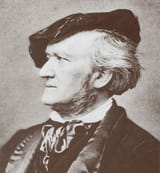>>127501167
In order to elucidate from his innermost processes a typical day in the life of Beethoven I therefore choose the great C sharp minor Quartet: while this would be difficult to achieve by listening, because we should then immediately feel compelled to let go all certain comparisons and only perceive direct revelation from another world, we might manage this to some extent by recalling the piece from memory only. Even here I must, however, once again leave it to the reader’s imagination to bring to life the exact details of the picture, and for this reason I offer my help only with a very general outline.
I would like to describe the rather long introductory Adagio, surely the most melancholy ever to have been expressed in music, as the morning awakening of a day 'which in its long course will fulfil no wish, not one!’ Yet at the same time it is a prayer of repentance, a discourse with God on belief in the eternally good. The inward-looking eye alone sees there a comforting vision (Allegro 6/8) in which desire becomes a bitter-sweet game with itself: the innermost dream image awakes to a most lovely recollection. And it is now as if (in the short transitional Allegro Moderato) the Master, conscious of his art, settles himself to his magic work: he now exercises (Andante 2/4) with renewed vigour the power of this peculiar magic to capture a graceful form in order to delight tirelessly in it as the blessed testimony of innermost innocence, constantly changing through the breaking rays of the eternal light which he casts upon it.

